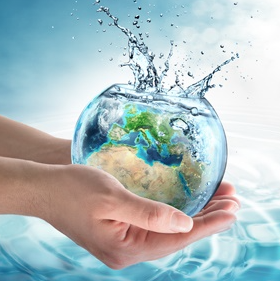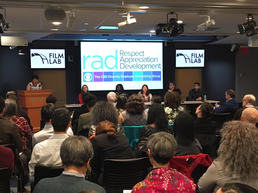
I recently took advantage of a Department of Environmental Protection (DEP) program that allowed me to test the tap water for lead at no cost. I tested the water in two different buildings in New York City so I would have a point of comparison. One came back 0 ppb (parts per billion) of lead, which is awesome and exactly what it should be - yay New York City water! However, the other, shockingly, came back at 39 ppb. That is terrifying. For point of reference, the lead "action level" for the Centers for Disease Control (CDC) is "only" 15 ppb (https://www.cdc.gov/nceh/lead/tips/water.htm). This second building with the bad results had suffered from a lot of construction work and it's possible the high test results were from some sort of corrosion issue. I notified the building's management and Board of Directors immediately. To my relief, they hired a third party to come in to test the water throughout the building. However, to my surprise, they declined to put residents - many of whom have babies or little children, for whom NO level of lead is safe - on notice or provide them with any advice, guidance or safety tips. So, I called the DEP, the EPA and basically every other "expert" I could think of for advice and insights to share here because water quality is a general concern for everyone. Lead is obviously really scary, although, luckily, less common, but there's also pesticide run-off to worry about in some areas, and, of course, the most common of all, micro plastic contamination in our water (see a great article on this in Furthermore). So, what's a gal (or guy) to do?
1. Test Your Water
Empower yourself with knowledge and test your tap water. In New York City, the Lead Department will provide you with a free lead test for your tap water. Just call (718) 595-5364 or 311 to request a test kit. Testing takes about two weeks. In Los Angeles, CalWater will give you information about lead testing for City water (click here for more). Other cities across the country have similar programs. If you're unsure and a search on your City government's web page gives you nothing, call your local elected official or local DEP office to ask. If all else fails, you can buy water testing kits at Home Depot and some pharmacies, though I think they might be a bit less accurate. I'm not an expert, though, so try them and see. You can always research their legitimacy via trusted sources, like Consumer Reports, online.
2. Say NO to Plastics and NO to Bottled Water
What?! Won't bottled water be better for us than tap? The perhaps surprising answer is probably not - unless you're in Flint, Michigan, and your tap water was basically poison, or Chicago, Illinois (see more on Chicago's lead issue here). New York City and Los Angeles (my two cities) have pretty consistently great water quality.
The problem people don't often know about is that bottled water contains a ridiculous amount of microplastic contamination. According to Sherri Mason, Ph.D., professor of chemistry and chair of the department of geology and environmental sciences at the State University of New York at Fredonia:
[This] "non-biodegradable material lingers in the environment, where it soaks up contaminants known to increase risks of autism, ADHD, and breast and prostate cancers before potentially finding its way back into water sources...[].... (That means tap water can also be contaminated, but the report found twice as many particles in bottled products.) Microplastics could also be introduced during manufacturing or from the bottles and caps themselves. It’s a new field of research, but the WHO review aims to find out more." Emphasis added. From Furthermore. Read the whole article here.
What does Dr. Mason advise? DRINK TAP WATER and avoid plastic bottles whenever you can. Use re-useable glass bottles like the ones I blogged about here and re-fill them.
3. Add Spirulina and Chlorella to Your Diet
Chlorella and Spirulina are amazing green foods to add to your diet for overall health and well-being and Chlorella has the added benefit of helping the body to detox from heavy metals (like lead). Cilantro is another good one to help with detox - just make sure it's organic since conventionally grown cilantro tested positive for a lot of pesticides in independent tests. According to Better Nutrition:
"Spirulina is a natural multivitamin, and a vegan source of protein and omega-3 fatty acids. It’s also rich in phycocyanin, a powerful polyphenolic compound. Chlorella is best for heavy metal detox and tumor suppression. It also promotes healthy bone growth and cellular replication. Both are similar in that they are chlorophyll-rich algae. Both are rich in essential amino acids, low in fat, and high in fiber and minerals. Chlorophyll is a natural anti-inflammatory, antioxidant, and wound healer that has been found to aid in normalizing the blood counts of anemic individuals. Both algae contain some vitamin B. Along with the usual vitamin and mineral suspects found in deep green plant foods—B vitamins, carotenoids, magnesium, and vitamin C—chlorella also contains some potent flavonoid nutrients, including lutein, which is important for eye health. Chlorella also contains a rare xanthophyll, a type of carotenoid that, like beta-carotene, has vitamin A activity." https://www.betternutrition.com/features-dept/green-foods-health-benefits
I make vegan cheeses with Spirulina (see more on that here and here) and also add both Spirulina and Chlorella to smoothies, soups and veggie stews. Here are some quick, easy recipe links to help you add these detoxing superfoods to your diet (I also posted a bunch more on the Ethical Is Beautiful Facebook page (www.facebook.com/EthicalIsBeautifulBeBeautiful):
Chlorella & Cacao Balls (recipe here) are a perfect dessert and densely nutritious snack-on-the go. I modified the original recipe by adding 3 T of spirulina in addition to the chlorella and rolling them in shredded coconut instead of chia seeds
Chilled Green Gazpacho Soup (recipe here) is a fabulous appetizer and perfect for summer garden parties or lunch on a hot day
Matcha Ice Cream is a treat (recipe here) and you can add a tablespoon or two of chlorella to help with heavy metal detox
Easy Green Trail Mix Bars (recipe here) are a meal-in-a-pinch and great as pre or post workout fuel, not to mention all the detox benefits. Plus, they're super quick and easy to make
4. Use Baking Soda to Get Rid of Pesticides on Fruits and Veggies
Ditch the hyped-up vegetable and fruit washes they sell in stores - so many of them are full of plastic and unnecessary chemicals and they're ridiculously over-priced. You can make a safer, less expensive and more effective rinse at home. Just put warm water, a handful of salt and a heaping tablespoon of baking soda in a spray bottle or a bowl and rinse your fruits and veggies in it (if they're conventionally grown, leave them in the baking soda water for at least 2 minutes to remove the maximum amount of pesticides), then do a quick cool water rinse to remove the salt and baking soda. Read more about how baking soda is amazing at removing pesticides in Consumer Reports here and Business Insider here.
5. Basic Tips from the DEP for Keeping Lead Away
And, now, from the experts themselves, some easy tips for what you can do to make your water safer:
1. Once a month, remove the aerators from your faucets (aka the little faucet "screen" the water comes through) and clean it. Metal debris can get caught in there.
2. Use cold water for cooking and baby formula; it is less likely to contain lead than hot water.
3. If you have a positive lead test, consider a filter but be VERY careful because so many are a lot of hype and independent testing actually shows they don't take out the amounts of lead they promise. In other words, do your research and, remember, avoid plastics. You don't want to trade one health issue for another. NSF International is a good resource to start with. It is a nonprofit organization that certifies water filters. You can also call the Consumer Affairs Office toll-free hotline: 1-800-673-8010.
6. Be an Eco-Friendly, Responsible Person
So many of our environmental problems are our own fault. Most of us don't think about the environment on a daily basis or consider how our actions affect it. We dump chemicals into the street drains, sending them directly into our oceans; we fail to recycle; we use plastic bottles and bags; etc., etc. We fall into the trap of thinking the environment is such a big problem that our "little" actions can't possibly make any difference and we couldn't be more wrong! Just as one single person going vegetarian saves 100 living beings from slaughter each year, one single person behaving as an eco-friendly consumer (recycling, reducing plastic use, composting, etc.) has profound positive effects on our environment.
But it's overwhelming, right? Let me help you simplify:
1. RECYCLE
Here is a great guide for how to recycle virtually anything. Ask your office or, if you live in a condo or apartment building, your building management to install Terracycle bins throughout the office and/or residential building to help recycle everything (and even earn Terracycle "bucks" for doing so!). More on that here.
2. DITCH THE PLASTIC
We already talked about why plastic water bottles are so horrible for your health, but plastic bags aren't doing us any favors either. Ask for paper bags or, better yet, bring and use a re-useable cloth bag when you shop. Be vocal and insistent with meal and grocery delivery services you may use in demanding that they reduce their plastic use and use eco-friendly, sustainable, recyclable packaging materials. When consumers are loud and insistent, they very often get what they want.
3. BUY FRESH LOCAL FRUITS, VEGGIES AND GRAINS WHENEVER POSSIBLE
If you're rural, this is easier, however, even if you're urban, farmer's markets are popping up all over the place. This is another time to call your local elected officials and ask for more farmer's markets and access to locally grown, organic fruits, veggies and grains. If you have the ability, your own garden is a great idea, even if it's just a herb garden in your windowsill and a climbing tomato plant on your balcony (that's what I have!). It's actually kind of fun to cultivate your own food (and I do NOT have a green thumb).
4. GO CRUELTY-FREE
The meat and dairy industry causes more greenhouse gas emissions than the exhaust from every car in our country, all sorts of nasty run-off into our groundwater and some seriously disgusting soil contamination. See more here. The more you can remove meat and dairy from your diet, the more you'll be doing yourself and the planet a huge favor. How to do that? Funny you should ask! I have a whole blog post on it here and many recipes and resources - just see the index, on the right of this page.
Awesome. Now, go drink clean water, be happy and save the world, ok?



 RSS Feed
RSS Feed
